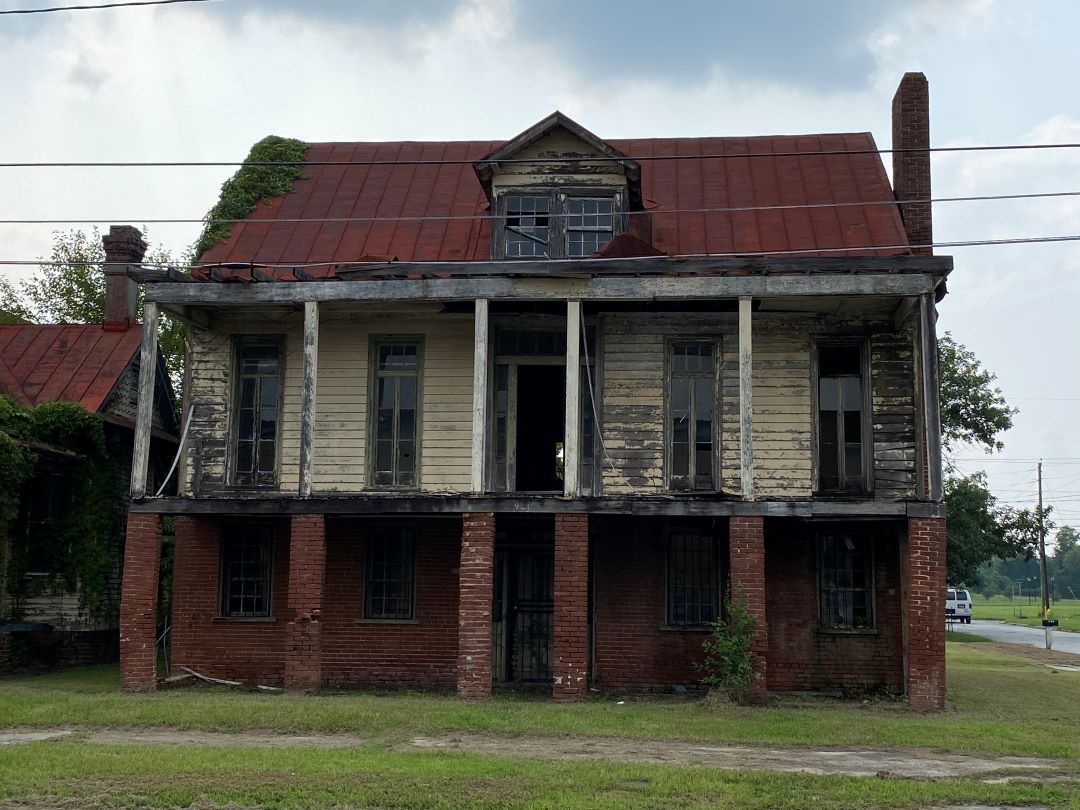Several of the dilapidated structures in the heart of downtown belong to retired Senior Judge Carl Brown Jr.
The discovery was made while researching the Denning House property, located at 905 Seventh St.
On July 20, City Administrator Odie Donald referenced a list of 300 properties already slated for examination under the new blight ordinance. Three of Brown’s Seventh Street properties are on the list, according to after that list of blighted properties. The list was acquired with an open records request.
Something You Might Not Have Known: Denning House
Brown owns not just the historic Denning House but also nearly a quarter of the block. Structures at 905, 907, 909, 913 and 915 Seventh Street are listed as belonging to Brown. Those buildings have belonged to Brown and his family for decades.
According to deeds recorded with the Clerk of Superior Court, Brown inherited the Denning property from his father, Carl Brown Sr., in 1999.
Visual inspection of the house from the outside shows trees and vines engulfing most of the dilapidated structures. Records show that the city has, for years, attempted to get Brown to maintain his properties. However, there are no records that Brown ever brought the properties into compliance with city codes.
Open records requests also revealed that no mothball permit was ever obtained on the properties.
According to Section 7-1-19 of the Augusta Code, mothballing is an option for an owner to shutter a property in order to have time to come up with a plan to fix the structure rather than complying with the current code violations.
The code states, “Mothballing is defined as a method used to protect a vacant structure from weather damage and vandals while preserving the structure for future use. The goal of mothballing is to temporarily protect the property to allow the owner to plan the property’s future, or acquire funds for preservation, rehabilitation or restoration. In historic districts, the owner, prior to mothballing, must obtain a certificate of appropriateness pursuant to Augusta-Richmond County Code Title 7, Chapter 4, Article 4, Application to Preservation Commission for certificate of appropriateness.”
Open records requests show that Brown never responded to Code Enforcements violations notices or pulled a mothball permit.
According to a search of the Clerk of Superior Court deed books, Brown has multiple open liens on the properties that have not been canceled. While the liens may have been paid in full by now, there is no indication that the liens are not still in place.
Code Enforcement violation notices obtained through open records requests show that the city finally stepped in 2017 and issued multiple violations because the buildings were open to the public, uninhabitable and presented a public health or safety threat. Pictures attached to those notices show that the properties were condemned at some point prior to those notices being sent to Brown.
Marquis Leverett of the Code Enforcement Department, noted that the “Structure needs to be repaired or demolished, it has been in this condition for a long period of time.”
The violation notices gave Brown 30 days to take action, however, the 2017 notices are the last of the city records that are available.
After waiting the required 30 days, the city could have taken Brown to Magistrates Court and forced him to demolish the buildings, or city officials could have asked for an injunction that would have allowed the city to complete the demolition at Brown’s expense.
However, it appears that any progress made in taking the matter to court ground to a halt in 2019.
John Manton, a attorney with Shepard, Plunkett & Hamilton, which does work for the city land bank, could not provide an explanation as to why the matter was never taken to court. Manton stated that his office was never pressured by Brown to stop the process.
Other sources close to the matter who wish to remain unnamed say that Brown’s name and status alone would have been enough to cause the city to pause their attempts.
“Who wants to be the attorney to take a Superior Court judge to court?” the source said.
For his part, Brown says that the buildings aren’t in that bad of shape and that he eventually plans to restore all of them. Particularly, Brown insisted that he kept the grass around the buildings cut every month, and he didn’t feel the buildings presented any danger.
Brown says that he grew up in a shotgun house on Laney Walker Boulevard and wants to restore all the properties he owns to become affordable housing.
“That’s a historic African American area of town, and I don’t want to tear them down and create a vacant lot when they can be restored,” Brown said.
Experts disagree on the probability of the homes ever being restored, as they have been condemned for years.
The Denning House alone has brick columns and wooden columns on the front porches that appear to be in a state of failure. Nearly every window of the mansion is broken out, and the wooden structure has gaping holes. Pictures taken by the city in 2017 show the interior throughout the house crammed with junk that is weighing down the already compromised support structure.
Historic Augusta placed Denning House on its endangered properties list many years ago, and while Director Eric Montgomery says he would love to see the property restored, it is likely just too far gone.
“It would take a lot of money, lots and lots of money,” Montgomery said.
Scott Hudson is the Senior Reporter for The Augusta Press. Reach him at scott@theaugustapress.com.











